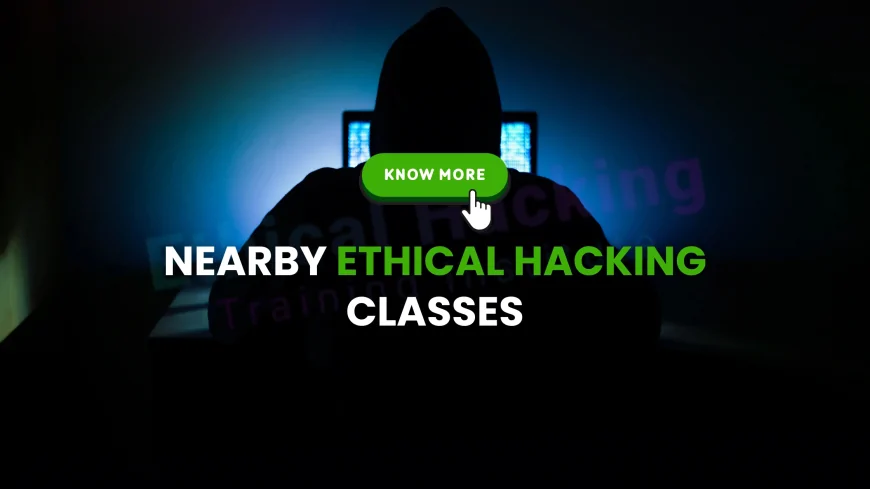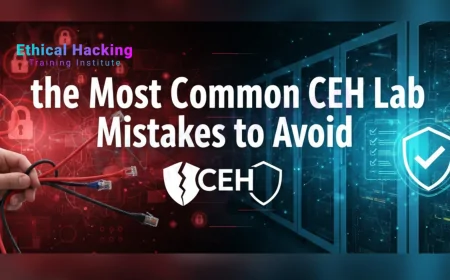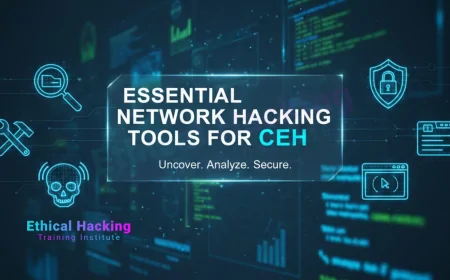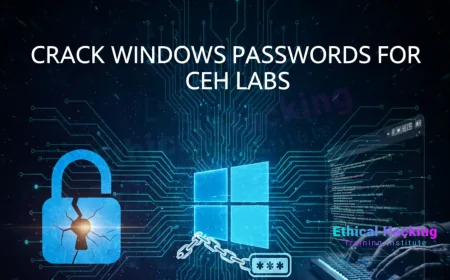Find Hacking Courses Near You: Locally Available Options for Aspiring Ethical Hackers | Top Hacking Courses Near Me: Local Learning Opportunities for Beginners
Explore top ethical hacking courses near you. Learn cybersecurity, penetration testing, and become a certified ethical hacker with hands-on training.

Table of Contents
- Introduction
- Why Learn Ethical Hacking?
- Types of Hacking Courses Available Locally
- How to Find Hacking Courses Near You
- Key Skills You Will Learn
- Certifications You Can Pursue
- Benefits of Local Ethical Hacking Courses
- Top Institutes Offering Local Cyber Security Courses
- Tips for Selecting the Right Ethical Hacking Course for You
- Real-Life Success Stories
- Career Opportunities After Completing Hacking Courses
- Frequently Asked Questions (FAQs)
- Conclusion
Introduction
With cyber threats on the rise, ethical hacking has become one of the most in-demand skills in the cybersecurity industry. Whether you're a student, IT professional, or career switcher, finding ethical hacking courses near you can open the door to exciting job opportunities. This guide is designed to help you explore all the local options available for ethical hacking training and how to choose the right path toward becoming a Certified Ethical Hacker (CEH).
Why Learn Ethical Hacking?
Ethical hacking is the legitimate practice of simulating cyberattacks to assess and improve a system’s defenses. Learning hacking teaches you to think like a hacker, which is essential for building secure systems. It enhances your analytical thinking, exposes you to real-world cybersecurity challenges, and prepares you for high-paying jobs.
Types of Hacking Courses Available Locally
- Beginner Ethical Hacking Courses: For those new to cybersecurity.
- Advanced Penetration Testing Programs: Focused on simulating sophisticated cyber attacks.
- CEH (Certified Ethical Hacker) Training: Industry-recognized preparation course.
- Workshops & Bootcamps: Short-term practical programs on hacking tools and techniques.
- Corporate Cyber Security Courses: Tailored for IT teams within local businesses.
How to Find Hacking Courses Near You
Here are methods to locate the best ethical hacking classes near your location:
- Search on Google Maps using keywords like “ethical hacking course near me”.
- Consider enrolling at nearby IT institutes, community colleges, or certified training centers.
- Browse tech communities and local cybersecurity meetups.
- Ask in social media groups related to cybersecurity education.
- Look at bulletin boards in co-working spaces or tech parks.
Key Skills You Will Learn
- Network scanning and enumeration
- Exploitation and penetration testing
- Social engineering and phishing simulations
- Vulnerability assessment and risk mitigation
- Use of tools like Nmap, Metasploit, Burp Suite
Certifications You Can Pursue
- CEH – Certified Ethical Hacker
- CompTIA Security+
- OSCP – Offensive Security Certified Professional
- CHFI – Computer Hacking Forensic Investigator
- Certified Penetration Tester (CPT)
Benefits of Local Ethical Hacking Courses
- In-person interaction: Real-time support from instructors
- Hands-on labs: On-site lab environments for real-world practice
- Network building: Meet local professionals and enthusiasts
- Placement support: Institutes often partner with hiring firms
Top Institutes Offering Local Cyber Security Courses
Examples (may vary by location):
- WebAsha Technologies – Known for weekend ethical hacking workshops ,Offers a certified cyber security diploma
Tips for Selecting the Right Ethical Hacking Course for You
Consider the following while selecting a local ethical hacking course:
- Accreditation and reputation of the training provider
- Curriculum aligned with global standards (CEH, OSCP)
- Availability of hands-on labs and practical modules
- Batch flexibility—weekend, evening, or part-time
- Post-training job assistance or internship support
Real-Life Success Stories
Many professionals who completed local hacking courses have transitioned to roles like Penetration Tester, Security Analyst, and SOC Engineer. For example, Ravi Sharma from Pune enrolled in a weekend CEH bootcamp and now works at a leading MNC as a Threat Intelligence Analyst.
Career Opportunities After Completing Hacking Courses
- Ethical Hacker / Penetration Tester
- Information Security Analyst
- Cyber Forensics Investigator
- Security Operations Center (SOC) Analyst
- Cybersecurity Consultant
Frequently Asked Questions (FAQs)
1. What is ethical hacking?
Ethical hacking is the authorized process of testing and penetrating computer systems to identify and fix security vulnerabilities before malicious hackers can exploit them.
2. Is it legal to learn hacking?
Yes, learning ethical hacking is legal as long as it is performed with permission and for educational, testing, or security improvement purposes.
3. What qualifications do I need to start learning ethical hacking?
No formal qualifications are required, but basic knowledge of computers, networking, and programming is highly recommended.
4. Which is the best ethical hacking certification?
The Certified Ethical Hacker (CEH) certification by EC-Council is one of the most recognized ethical hacking certifications globally.
5. How do I find ethical hacking courses near me?
You can use Google Maps, local training centers, IT institutes, and websites like Justdial, Sulekha, or UrbanPro to find ethical hacking courses in your area.
6. Are there offline ethical hacking classes available?
Yes, many local institutes and training centers offer offline (in-person) ethical hacking classes with hands-on labs and workshops.
7. How long does it take to become a certified ethical hacker?
It typically takes 3 to 6 months to become a certified ethical hacker, depending on your background and the intensity of the training.
8. What tools will I learn in ethical hacking courses?
You will learn tools like Nmap, Metasploit, Wireshark, Burp Suite, John the Ripper, and others commonly used in penetration testing and vulnerability analysis.
9. Can I learn ethical hacking online and offline?
Yes, most reputable institutes offer both online and offline options depending on your preference and availability.
10. Do ethical hacking courses offer job placement?
Many institutes provide placement assistance, internships, and job referrals after course completion, especially for certified students.
11. Is programming required for ethical hacking?
While not mandatory for beginners, knowledge of programming languages like Python, Bash, or JavaScript is beneficial in ethical hacking.
12. What is the average salary of an ethical hacker?
Entry-level ethical hackers in India earn ₹4–6 LPA, while experienced professionals can earn ₹10–25 LPA or more depending on their role and certifications.
13. Are there weekend ethical hacking courses?
Yes, many training centers offer weekend and evening batches for working professionals and students.
14. Can I take ethical hacking courses after 12th grade?
Yes, students who have completed their 12th grade can enroll in beginner-level ethical hacking and cybersecurity programs.
15. What is penetration testing?
Penetration testing is the process of simulating cyber attacks to evaluate and improve a system's security by finding exploitable vulnerabilities.
16. Are there government-recognized ethical hacking courses?
Yes, some courses are approved by government bodies like NASSCOM, NSDC, and even recognized by state technical education boards.
17. What industries hire ethical hackers?
Ethical hackers are hired across industries including banking, IT services, e-commerce, government agencies, healthcare, and telecom.
18. What are some popular institutes for ethical hacking training?
Popular institutes include Jetking, WebAsha Technologies, RedTeam Hacker Academy, Aptech, and Indian Cyber Security Solutions.
19. What is the difference between a hacker and an ethical hacker?
A hacker exploits systems for malicious purposes, while an ethical hacker tests systems legally to improve their security.
20. Can I work as a freelancer after learning ethical hacking?
Yes, many ethical hackers work independently as consultants, bug bounty hunters, or freelance penetration testers.
Conclusion
If you're passionate about defending the digital world, there’s never been a better time to learn ethical hacking. By enrolling in a reputable local hacking course, you gain valuable skills, hands-on experience, and globally recognized certifications. This career path not only offers high salaries but also the satisfaction of protecting individuals and organizations from cyber threats. Start your journey today by finding a hacking course near you!
What's Your Reaction?
 Like
0
Like
0
 Dislike
0
Dislike
0
 Love
0
Love
0
 Funny
0
Funny
0
 Angry
0
Angry
0
 Sad
0
Sad
0
 Wow
0
Wow
0

















